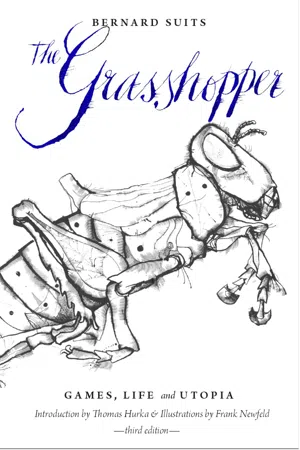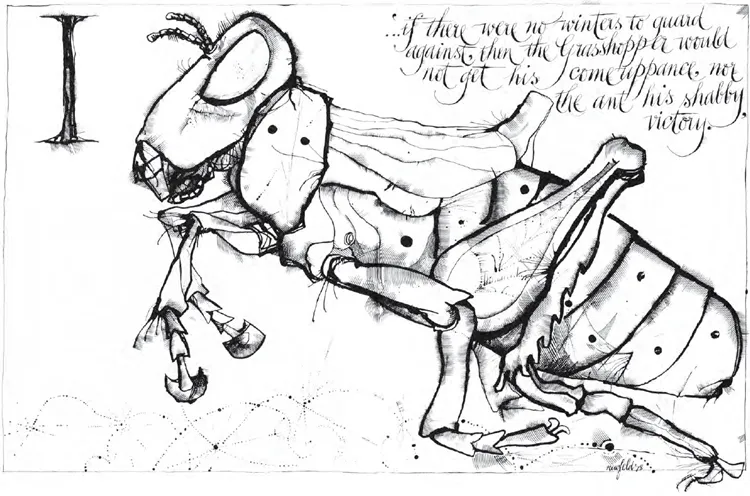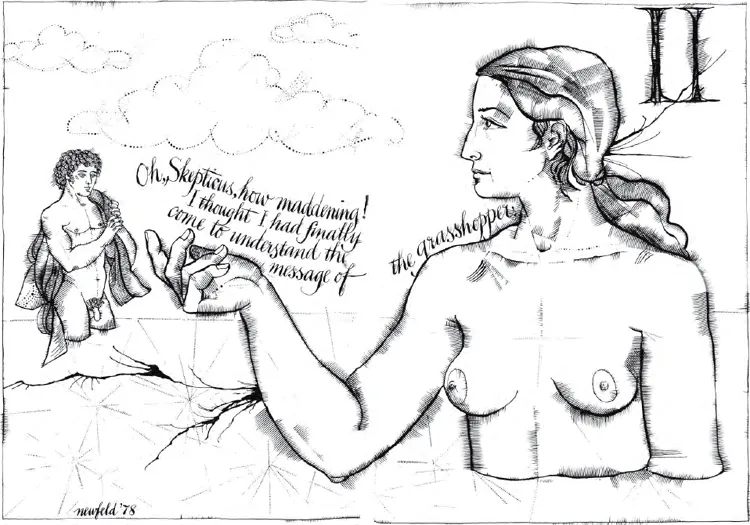one
Death of the Grasshopper
In which the Grasshopper, after defending to his disciples his way of life and impending death, dies
‘My dear child,’ responded the Grasshopper, ‘you still don’t understand. The fact is that I will not work to pay you back. I will not work at all. I made that perfectly clear, I thought, when the ant turned me away from his door. My going to him in the first place was, of course, a mistake. It was a weakness to which I shall not give in again.’
‘But,’ continued Prudence, ‘we don’t begrudge you a portion of our food. If you like, we will not require you to pay us back. We are not, after all, ants.’
‘No,’ replied the Grasshopper, ‘you are not ants, not any more. But neither are you grasshoppers. Why should you give me the fruits of your labour? Surely that would not be just, when I tell you quite clearly that I will not pay you back.’
‘But that kind of justice,’ exclaimed Prudence, ‘is only the justice of ants. Grasshoppers have nothing to do with such “justice.”’
‘You are right,’ said the Grasshopper. ‘The justice which is fairness in trading is irrelevant to the lives of true grasshoppers. But there is a different kind of justice which prevents me from accepting your offer. Why are you willing to work so that I may live? Is it not because I embody in my life what you aspire to, and you do not want the model of your aspirations to perish? Your wish is understandable, and to a certain point even commendable. But at bottom it is inconsistent and self-defeating. It is also—and I hope you will not take offence at my blunt language—hypocritical.’
‘Those are hard words, Grasshopper.’
‘But well meant. My life, you must understand, was not intended to be a sideshow, yet that seems to be what you want to make of it. You should value me because you want to be like me, and not merely so that you can boast to the ants that you are an intimate of the Grasshopper, that oddity of nature.’
‘We have never done that, Grasshopper!’
‘I believe you. But you might as well have done so if you believe that your proposal is a good one. For it amounts to working because I will not. But the whole burden of my teaching is that you ought to be idle. So now you propose to use me as a pretext not only for working, but for working harder than ever, since you would have not only yourselves to feed, but me as well. I call this hypocritical because you would like to take credit for doing something which is no more than a ruse for avoiding living up to your ideals.’
At this point Skepticus broke in with a laugh. ‘What the Grasshopper means, Prudence,’ he said, ‘is that we do not yet have the courage of his convictions. The point is that we should not only refuse to work for the Grasshopper, we should also refuse to work for ourselves. We, like him, should be dying for our principles. That we are not is the respect in which, though no longer ants, we are not grasshoppers either. And, of course, given the premise that the life of the Grasshopper is the only life worth living, what he says certainly follows.’
‘Not quite, Skepticus,’ put in the Grasshopper. ‘I agree that the principles in question are worth dying for. But I must remind you that they are the principles of Grasshoppers. I am not here to persuade you to die for my principles, but to persuade you that I must. We ought to be quite clear about our respective roles. You are not here to die for me, but I for you. You only need, as Skepticus put it, the courage of my convictions up to a point; that is, courage sufficient to approve rather than to deplore my death. Neither of you is quite prepared to grant that approval, though for different reasons. You, Prudence, because, although you believe the principles are worth dying for, you do not believe they need to be died for; and you, Skepticus, because you are not even sure that the principles are worth dying for.’
‘Although,’ replied Skepticus, ‘I believe you to be the wisest being alive—which is why I have never left your side during the whole summer of your life—I have to admit that I am still not convinced that the life of the Grasshopper is the best life to live. Perhaps if you could give me a clearer vision of the good life as you see it my convictions would approach yours, and my courage as well. You might do this by one of the parables for which you are justly esteemed.’
‘Parables, my dear Skepticus.’ replied the Grasshopper, ‘ought to come at the end, not at the beginning, of serious inquiry; that is, only at the point where arguments fail. But speaking of parables, you may be sure that the ants will fashion one out of my career. They will very likely represent my life as a moral tale, the point of which is the superiority of a prudent to an idle way of life. But it should really be the Grasshopper who is the hero of the tale; it is he, not the ant, who should have the hearer’s sympathy. The point of the parable should be not the ant’s triumph, but the Grasshopper’s tragedy. For one cannot help reflecting that if there were no winters to guard against, then the Grasshopper would not get his come-uppance nor the ant his shabby victory. The life of the Grasshopper would be vindicated and that of the ant absurd.’
‘But there are winters to guard against,’ Prudence protested.
‘No doubt. Still, it is possible that with accelerating advances in technology the time will come when there are in fact no winters. We may therefore conclude that although my timing may be a bit off, my way of life is not wrong in principle.’
‘The operation was successful but the patient died,’ put in Skepticus.
‘No,’ replied the Grasshopper, ‘it’s not quite like that. That my way of life may eventually be vindicated in practice is, now that I think of it, really beside the point. Rather, it is the logic of my position which is at issue. And this logic shows that prudential actions (e.g., those actions we ordinarily call work) are self-defeating in principle. For prudence may be defined as the disposition 1/ to sacrifice something good (e.g., leisure) if and only if such sacrifice is necessary for obtaining something better (e.g., survival), and 2/ to reduce the number of good things requiring sacrifice—ideally, at least—to zero. The ideal of prudence, therefore, like the ideal of preventive medicine, is its own extinction. For if it were the case that no sacrifices of goods needed ever to be made, then prudential actions would be pointless, indeed impossible. This principle, knowledge of which I regard as an indispensable first step on the path to wisdom, the ants seem never even to have entertained. The true Grasshopper sees that work is not self-justifying, and that his way of life is the final justification of any work whatever.’
‘But surely,’ replied Skepticus, ‘you are carrying your point to an unreasonable extreme. You talk as though there were but two possible alternatives: either a life devoted exclusively to play or a life devoted exclusively to work. But most of us realize that our labour is valuable because it permits us to play, and we are presumably seeking to achieve some kind of balance between work input and play output. People are not, and do not want to be, wholly grasshoppers or wholly ants, but a combination of the two; people are and want to be (if you will forgive a regrettably vulgar but spooneristically inevitable construction) asshoppers or grants. We can, of course, all cease to work, but if we do then we cannot play for long either, for we will shortly die.’
‘I have three answers to make to what you have said, Skepticus, and I fear I shall have to make them quickly, for the sun has set and the frost is already creeping through the fields. First, evidently I was put on earth just to play out my life and die, and it would be impious of me to go against my destiny. That is, if you like, the theology of the case. But second, there is also a logic of the case which is as inescapable as fate or, if you like, a fate of the case which is as inescapable as logic. The only argument against living the life of the Grasshopper arises from the contingent fact that at present one dies if one does not work. The answer to that argument is that my death is inevitable in any case. For if I am improvident in summer, then I will die in winter. And if I am provident in summer, then I will cease to be the Grasshopper, by definition. But I will be either provident or improvident in summer; there is no third alternative. Therefore, either I die or I cease to be the Grasshopper. But since I am just the Grasshopper, no more and no less, dying and ceasing to be the Grasshopper are one and the same thing for me. I cannot escape that logic or that fate. Still, since I am the Grasshopper and you are not, it would seem to follow that you are not compelled by this logic. As I intimated earlier, I often think that I was put on earth just to die for you; to bear that heavy but inevitable cross. But I confess that that is when I am in something of an early Christian—or late pagan—frame of mind. At other times (and this brings me to my third and final answer to your objection, Skepticus) I have the oddest notion that both of you are Grasshoppers in disguise; in fact, that everyone alive is really a Grasshopper.’
At this Prudence whispered to Skepticus, ‘The end must be near; his mind is beginning to wander.’ But Skepticus just looked keenly at their friend and teacher as he continued to speak.
‘I admit that this is a wild fancy,’ the Grasshopper was saying, ‘and I hesitate to tell you my thoughts. Still, I am used to being thought foolish, so I shall proceed, inviting you to make of my words what you will. Then let me tell you that I have always had a recurring dream, in which it is revealed to me—though how it is revealed I cannot say—that everyone alive is in fact engaged in playing elaborate games, while at the same time believing themselves to be going about their ordinary affairs. Carpenters, believing themselves to be merely pursuing their trade, are really playing a game, and similarly with politicians, philosophers, lovers, murderers, thieves, and saints. Whatever occupation or activity you can think of, it is in reality a game. This revelation is, of course, astonishing. The sequel is terrifying. For in the dream I then go about persuading everyone I find of the great truth which has been revealed to me. How I am able to persuade them I do not know, though persuade them I do. But precisely at the point when each is persuaded—and this is the ghastly part—each ceases to exist. It is not just that my auditor vanishes on the spot, though indeed he does. It is that I also know with absolute certainty that he no longer exists anywhere. It is as though he had never been. Appalled as I am by the results of my teaching, I cannot stop, but quickly move on to the next creature with my news, until I have preached the truth throughout the universe and have converted everyone to oblivion. Finally I stand alone beneath the summer stars in absolute despair. Then I awaken to the joyful knowledge that the world is still teeming with sentient beings after all, and that it was only a dream. I see the carpenter and philosopher going about their work as before … But is it, I ask myself, just as before? Is the carpenter on his roof-top simply hammering nails, or is he making some move in an ancient game whose rules he has forgotten? But now the chill creeps up my legs. I grow drowsy. Dear friends, farewell.’
two
Disciples
In which Skepticus and Prudence discover that the Grasshopper has left them with a tangle of riddles about play, games, and the good life
THE NEXT DAY SKEPTICUS CALLED UPON A GRIEVING PRUDENCE.
SKEPTICUS: It is time to put aside your grief, my girl, and help me examine our bequest.
PRUDENCE: (drying her eyes) What bequest?
S: Why, the Grasshopper’s dream, of course. I have been awake the whole night trying to puzzle it out.
P: (blowing her nose) It was certainly very strange.
S: Yes, it was. But it strikes me that even stranger than the dream itself was the Grasshopper’s telling us about it at all.
P: Why do you say that?
S: Well, the Grasshopper didn’t tell us about the dream just because it was an interesting dream. He brought it up in the course of answering a question I had asked him. In effect, I had put it to him that while all work and no play undoubtedly makes Jack a dull ant, all play and no work makes Jack a dead grasshopper.
P: Yes, you were challenging him to justify his existence.
S: Quite so. And he made three replies to that challenge. The first he called the theological answer and the second he called the logical answer.
P: That’s right.
S: And what about the third answer, Prudence?
P: The third answer was the dream.
S: Yes, a dream about people playing games. That is what is so strange.
P: What is so strange about that? Surely the strangeness lies in the fact that they were playing unconscious games, and that they vanished as soon as they realized that that was what they were doing.
S: Oh, that is strange, I grant you. But it is just the kind of strangeness you expect a dream to have. There is, however, another and, so to say, prior strangeness which must be fathomed before we can begin to fathom the strangeness of the dream itself.
P: What on earth are you talking about, Skepticus?
S: I am saying that there is a question we have to answer before we can solve the puzzle of the dream.
P: What question?
S: This question: Why were the creatures in the Grasshopper’s dream playing games instead of the trombone?
P: Skepticus...


